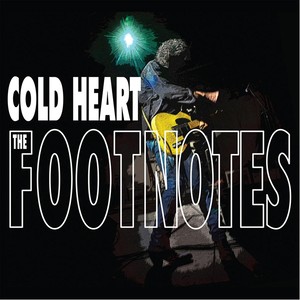
- 歌曲
- 时长
简介
"My earliest memories are of music," says "My earliest memories are of music," says Rick Eakens. "The first time I was exposed to rock 'n' roll as a kid, I was profoundly knocked out, and it's been the sound I've heard in my head ever since." The veteran singer-guitarist-songwriter has led The Footnotes, on and off, for most of his life, crafting the sound in his head into rootsy, high-energy rock 'n' roll that embodies the unpretentious attitude, catchy songcraft and high-energy abandon of the vintage classics that originally inspired him to make music. The Footnotes' feisty, uplifting live gigs have won the Houston-based trio a longstanding status as an under-the-radar regional legend. The Footnotes currently maintain a busy live schedule, in Houston, Austin and throughout Texas. But the band's history stretches back to the 1960s. Like an entire generation of American kids, Rick Eakens' life was forever changed on February 9, 1964, when, as a 12-year-old growing up on his family's ranch in Roswell, New Mexico, he witnessed the Beatles' debut appearance on The Ed Sullivan Show. The experience inspired him to pull the plug on six years of piano studies, get his first electric guitar, and launch the original, teenaged incarnation of the Footnotes. "Seeing the Beatles on Ed Sullivan was like a doorway into another world, especially for a kid living out in the middle of nowhere," he recalls. "I learned three chords, which eventually became five chords, and started making noise. It was so much fun and such an amazing feel of freedom, and that's pretty much what's driven me ever since." With the Beatles and Buddy Holly as his touchstones, and garage-rock combos like the Seeds and the Standells as role models, Eakens led the original Footnotes through gigs at local teen clubs and dances, and even played an impromptu gig backing a guitar-wielding stranger who turned out to be Chuck Berry. As the rock landscape changed in the '70s, Eakens served a five-year stint in a hard-touring Denver-based cover band, before returning home to New Mexico. There, he opened a pair of record stores, and fleshed out his musical vision by immersing himself in first-generation, pre-Beatles rock 'n' roll. "I went back and figured out where the Beatles had gotten it from," Eakens says. "I got deeply into rockabilly, and I fell in love with Gene Vincent and Eddie Cochran and Johnny Burnette and the Rock 'n' Roll Trio. I really submerged myself in that stuff, until it became a part of me. I remember sitting for 12 hours straight and listening to 'Boppin' the Blues' by Carl Perkins over and over, until it was 'OK, now I understand this.' That's when everything started to make a little more sense to me, and it gave me a direction and pointed me forward." That woodshedding period provided the impetus for the roots-conscious focus that would drive the next generation of the Footnotes. By the early '80s, the band was going strong as a stripped-down three-piece, playing a personalized brand of raw, raucous rock 'n' roll and winning an enthusiastic fan base by touring throughout the Southwest. "We were doing rockabilly, but instead of putting the beat of the one and the three, we changed the beat to the two and the four," Eakens explains. "It was applying the attitude of '60s garage rock to rockabilly, and it rocked." The Footnotes eventually settled in Houston, temporarily relocating to Nashville for a year-and-a-half stretch in the mid-'80s. In Nashville, the band became part of a rising Music City rock 'n' roll boom, spearheaded by fabled roots-rockers Jason and the Scorchers, that seemed poised for a national breakthrough that never arrived. In the process, a proposed major-label deal fell through at the last minute, and the Footnotes returned to the Houston scene, where they remained beloved local heroes. In Texas, the Footnotes became part of much-mythologized movement of iconoclastic young bands that included True Believers, the Wild Seeds and Doctors' Mob, with whom the Footnotes frequently toured and shared bills. After a period of reassessment and recharging, Eakens and bassist Allan Gill reactivated the Footnotes in 2011, maintaining the punchy, melodic style that had originally endeared the band to its fans. "From the beginning, the idea behind the Footnotes has always been to keep it simple and honest, and we're sticking with that," Eakens states. "It's basically garage music; it's attitude and emotion, with good songs and good playing and good harmonies. We're not virtuosos, but that's not the point. It's about energy and melody and looseness and fun. "I've reached a point in my life," Eakens concludes, "where I've realized that this is just what I do. I'm not doing it because I think it's gonna make me rich or famous. I'm doing it because I love it. I'm not hell-bent on making it now, the way I used to be, and that makes it a lot easier to enjoy. It's pretty much the same sound and the same kind of songs that I've been carrying around for the last 25 years, and I'm just gonna keep riding it until the wheels come off." "I am officially now addicted to this cd.....I've listened to it too many times to count and I try to walk away when its over but I can't and press start again!! Thank you again for giving Pat & Rosie's Night Sounds The Footnotes unreleased cd.....I'm pretty sure everyone is going to love it!! - Pat & Rosie's Night Sounds, 90.1 KPFT FM.

